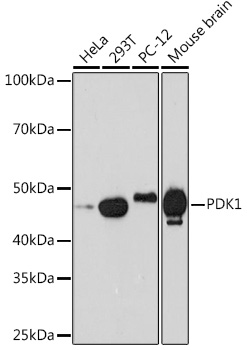Metabolism Antibodies 3
Anti-PDK1 Antibody (CAB8930)
- SKU:
- CAB8930
- Product Type:
- Antibody
- Reactivity:
- Human
- Reactivity:
- Mouse
- Reactivity:
- Rat
- Host Species:
- Rabbit
- Isotype:
- IgG
- Antibody Type:
- Monoclonal Antibody
- Research Area:
- Metabolism
Description
| Antibody Name: | Anti-PDK1 Antibody |
| Antibody SKU: | CAB8930 |
| Antibody Size: | 20uL, 50uL, 100uL |
| Application: | WB |
| Reactivity: | Human, Mouse, Rat |
| Host Species: | Rabbit |
| Immunogen: | A synthesized peptide derived from human PDK1 |
| Application: | WB |
| Recommended Dilution: | WB 1:500 - 1:2000 |
| Reactivity: | Human, Mouse, Rat |
| Positive Samples: | HeLa, 293T, PC-12, Mouse brain |
| Immunogen: | A synthesized peptide derived from human PDK1 |
| Purification Method: | Affinity purification |
| Storage Buffer: | Store at -20'C. Avoid freeze / thaw cycles. Buffer: PBS with 0.02% sodium azide, 0.05% BSA, 50% glycerol, pH7.3. |
| Isotype: | IgG |
| Sequence: | Email for sequence |
| Gene ID: | 5163 |
| Uniprot: | Q15118 |
| Cellular Location: | |
| Calculated MW: | 49kDa |
| Observed MW: | 49KDa |
| Synonyms: | |
| Background: | Pyruvate dehydrogenase (PDH) is a mitochondrial multienzyme complex that catalyzes the oxidative decarboxylation of pyruvate and is one of the major enzymes responsible for the regulation of homeostasis of carbohydrate fuels in mammals. The enzymatic activity is regulated by a phosphorylation/dephosphorylation cycle. Phosphorylation of PDH by a specific pyruvate dehydrogenase kinase (PDK) results in inactivation. Multiple alternatively spliced transcript variants have been found for this gene. [provided by RefSeq, Jun 2013] |
| UniProt Protein Function: | PDHK1: an ubiquitously expressed, atypical protein kinase associated with the mitochondrial matrix. The PDHKs play crucial roles in switching metabolic flux from oxidative phosphorylation towards glycolysis. PDHK1 is detected in heart, pancreatic islets, and skeletal muscles. Contains a HATPase_c catalytic domain, found in several ATP-binding proteins including protein histidine kinases (PHKs), PHDKs, DNA gyrase B, topoisomerases, heat shock proteins, and DNA mismatch repair proteins. PDHK regulates glucose oxidation through inhibitory phosphorylation of the E1 alpha subunit of the mitochondrial pyruvate dehydrogenase complex (PDHC) at any one of 3 inhibitory serine residues. Inhibitory sites 1, 2, and 3 correspond to S293, S300, and S232 in human PDHA1, respectively. Four PDHK isoenzymes have been described, each with different site specificity: all four phosphorylate sites 1 and 2 but at different rates; for site 1 PDHK2 >PDHK4 >PDHK1 >PDHK3; for site 2, PDHK3> PDHK4 > PDHK2 > PDHK1. Only PDHK1 phosphorylates site 3. PDHKs are recruited to the PDHC by binding to a lipoyl group covalently attached to the inner lipoyl domain of the E2 component. PDHA1 deficiency is the most common enzyme defect in patients with primary lactic acidosis. PDHK1 is a direct HIF-1 target gene. Suppression of PDH by PDHK inhibits the conversion of pyruvate to acetyl-CoA, attenuates mitochondrial respiration, and may contribute to the increased lactate production observed in many tumors. The PDH pathway is repressed in a majority of non-small cell lung carcinomas. Inhibited by AZD7545, dichloroacetate (DCA) and radicicol. Radicicol inhibits kinase activity by binding directly to the ATP-binding pocket of PDHK, similar to HSP90 from the same ATPase/kinase superfamily. |
| UniProt Protein Details: | Protein type:Mitochondrial; EC 2.7.11.2; Kinase, protein; Protein kinase, atypical; ATYPICAL group; PDHK family Chromosomal Location of Human Ortholog: 2q31.1 Cellular Component: mitochondrion; mitochondrial matrix; mitochondrial pyruvate dehydrogenase complex Molecular Function:protein binding; pyruvate dehydrogenase (acetyl-transferring) kinase activity; ATP binding; protein kinase activity Biological Process: cellular metabolic process; cell proliferation; glucose metabolic process; regulation of acetyl-CoA biosynthetic process from pyruvate; pyruvate metabolic process; protein amino acid phosphorylation; induction of apoptosis by oxidative stress |
| NCBI Summary: | Pyruvate dehydrogenase (PDH) is a mitochondrial multienzyme complex that catalyzes the oxidative decarboxylation of pyruvate and is one of the major enzymes responsible for the regulation of homeostasis of carbohydrate fuels in mammals. The enzymatic activity is regulated by a phosphorylation/dephosphorylation cycle. Phosphorylation of PDH by a specific pyruvate dehydrogenase kinase (PDK) results in inactivation. Multiple alternatively spliced transcript variants have been found for this gene. [provided by RefSeq, Jun 2013] |
| UniProt Code: | Q15118 |
| NCBI GenInfo Identifier: | 3183117 |
| NCBI Gene ID: | 5163 |
| NCBI Accession: | Q15118.1 |
| UniProt Secondary Accession: | Q15118,Q308M4, B2R6T1, B7Z937, D3DPD8, E9PD65, |
| UniProt Related Accession: | Q15118 |
| Molecular Weight: | 436 |
| NCBI Full Name: | [Pyruvate dehydrogenase (acetyl-transferring)] kinase isozyme 1, mitochondrial |
| NCBI Synonym Full Names: | pyruvate dehydrogenase kinase, isozyme 1 |
| NCBI Official Symbol: | PDK1 |
| NCBI Protein Information: | [Pyruvate dehydrogenase (acetyl-transferring)] kinase isozyme 1, mitochondrial; [Pyruvate dehydrogenase (acetyl-transferring)] kinase isozyme 1, mitochondrial; PDH kinase 1; pyruvate dehydrogenase kinase, isoenzyme 1; mitochondrial pyruvate dehydrogenase, lipoamide, kinase isoenzyme 1 |
| UniProt Protein Name: | [Pyruvate dehydrogenase (acetyl-transferring)] kinase isozyme 1, mitochondrial |
| UniProt Synonym Protein Names: | Pyruvate dehydrogenase kinase isoform 1; PDH kinase 1 |
| Protein Family: | [Pyruvate dehydrogenase |
| UniProt Gene Name: | PDK1 |
| UniProt Entry Name: | PDK1_HUMAN |
View AllClose







